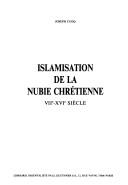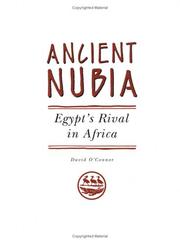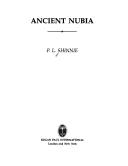| Listing 1 - 10 of 12 | << page >> |
Sort by
|
Book
ISBN: 0713905794 9780713905793 Year: 1977 Publisher: London Lane
Abstract | Keywords | Export | Availability | Bookmark
 Loading...
Loading...Choose an application
- Reference Manager
- EndNote
- RefWorks (Direct export to RefWorks)
Nubia --- History --- History. --- Nubia - History

ISBN: 2705301380 9782705301385 Year: 1986 Volume: 9 Publisher: Paris : Paul Geuthner,
Abstract | Keywords | Export | Availability | Bookmark
 Loading...
Loading...Choose an application
- Reference Manager
- EndNote
- RefWorks (Direct export to RefWorks)
Islam --- History. --- Histoire --- Nubia --- Nubie --- History --- Islam - Nubia - History --- Nubia - History

ISBN: 0924171286 9780924171284 Year: 1993 Publisher: London ; New York, NY ; Rheine : University of Pennsylvania Museum of archaeology and anthropology,
Abstract | Keywords | Export | Availability | Bookmark
 Loading...
Loading...Choose an application
- Reference Manager
- EndNote
- RefWorks (Direct export to RefWorks)
Nubia --- Nubie --- History --- Histoire --- Nūbah --- نوبة --- بلاد النوبة --- History. --- Nubia - History

ISBN: 0710305176 9780710305176 Year: 1996 Publisher: London: Kegan Paul,
Abstract | Keywords | Export | Availability | Bookmark
 Loading...
Loading...Choose an application
- Reference Manager
- EndNote
- RefWorks (Direct export to RefWorks)
Egypt --- Nubia --- Sudan --- Egypte --- Nubie --- Soudan --- Antiquities --- History --- Antiquités --- Histoire --- -History --- Antiquités --- Sudan - Antiquities. --- History. --- Nubia - - History --- Nubia - Antiquities --- Sudan - Antiquities --- Egypt - Antiquities --- -Nubia
Book
ISBN: 3921389801 9783921389805 Year: 1978 Volume: 31 Publisher: Sankt Augustin Anthropos-Institut
Abstract | Keywords | Export | Availability | Bookmark
 Loading...
Loading...Choose an application
- Reference Manager
- EndNote
- RefWorks (Direct export to RefWorks)
Tombs --- Nubia --- Meroë (Extinct city) --- Antiquities --- History --- Chronology --- Sudan --- Meroe (Sudan) --- Merowe (Extinct city) --- Nūbah --- نوبة --- بلاد النوبة --- Antiquities. --- Chronology. --- Tombs - Nubia --- Nubia - Antiquities --- Nubia - History - Chronology
Book
ISBN: 9789004269132 9789004273887 9004273883 9004269134 1306808480 Year: 2014 Volume: 368 Publisher: Leiden ; Boston : Brill,
Abstract | Keywords | Export | Availability | Bookmark
 Loading...
Loading...Choose an application
- Reference Manager
- EndNote
- RefWorks (Direct export to RefWorks)
Twentieth century commentaries on Herodotus' passages on Nubia, the historical kingdom of Kush and the Aithiopia of the Greek tradition, rely mostly on an outdated and biased interpretation of the textual and archaeological evidence. Disputing both the Nubia image of twentieth century Egyptology and the Herodotus interpretation of traditional Quellenkritik , the author traces back the Aithiopian information that was available to Herodotus to a discourse on Kushite kingship created under the Nubian pharaohs of the Twenty-Fifth Dynasty and preserved in the Ptah sanctuary at Memphis. Insufficient for a self-contained Aithiopian logos, the information acquired by Herodotus complements and supports accounts of the land, origins, customs and history of other peoples and bears a relation to the intention of the actual narrative contexts into which the author of The Histories inserted it.
Herodotus --- Knowledge --- Nubia --- Nubie --- History --- Sources. --- Histoire --- Sources --- Herodotus van Halicarnassus --- Herodot --- Gerodot --- Hērodotos --- Herodotos --- Erodoto --- Hérodote --- Heródoto --- הירודוטוס --- הרודוט --- הרודוטוס --- هردوت --- هيرودوت --- Ἡρόδοτος --- Nubia. --- Nūbah --- نوبة --- بلاد النوبة --- Herodotus - Knowledge - Nubia --- Nubia - History - Sources
Book
ISBN: 071410986X 9780714109862 Year: 1996 Publisher: Londres British Museum press
Abstract | Keywords | Export | Availability | Bookmark
 Loading...
Loading...Choose an application
- Reference Manager
- EndNote
- RefWorks (Direct export to RefWorks)
Meroe (Extinct city) --- Egypt --- Nubia --- Napata (Extinct city) --- Meroe (Ville ancienne) --- Egypte --- Nubie --- Napata (Ville ancienne) --- History --- Histoire --- Sudan --- Antiquities --- -History --- -Sudan --- -Antiquities --- Antiquities. --- Nūbah --- نوبة --- بلاد النوبة --- History. --- Nubia - History --- Egypt - History - To 332 BC --- Nubia - Antiquities --- Sudan - Antiquities
Book
ISBN: 3805333765 3805323921 3805335121 9783805333764 9783805323925 9783805335126 380533396X 9783805333962 Year: 2000 Volume: Band II Publisher: Mainz am Rhein : von Zabern,
Abstract | Keywords | Export | Availability | Bookmark
 Loading...
Loading...Choose an application
- Reference Manager
- EndNote
- RefWorks (Direct export to RefWorks)
Temples --- History. --- Design and construction. --- Egypt --- History --- Antiquities. --- Temples - Egypt - History. --- Temples - Egypt - Design and construction. --- Temples - Nubia - History. --- Temples - Nubia - Design and construction. --- Egypt - History - Greco-Roman period, 332 B.C.-640 A.D. --- Egypt - Antiquities. --- 21.70 religious architecture. --- 15.52 Roman Empire. --- Römerzeit. --- Tempels. --- Romeinse keizertijd. --- Tempel --- Kaiser --- Religion. --- Tempel. --- Religion égyptienne. --- Époque des conquêtes romaines (Rome ; 4e siècle av. J.-C.-395). --- Temples égyptiens. --- 332 B.C.-640 A.D. --- Geschichte. --- Égypte --- Egypt. --- Ägypten --- Römer --- Ägypten (altes) --- Ägypten (Altertum). --- Egypte antique. --- Histoire --- Antiquités. --- Antiquités égyptiennes --- Fouilles archéologiques --- Égypte --- 30 av. J.-C.-640 --- Nubie
Book
ISBN: 1463241577 9781463241568 1463241569 Year: 2020 Publisher: Piscataway, NJ : Gorgias Press,
Abstract | Keywords | Export | Availability | Bookmark
 Loading...
Loading...Choose an application
- Reference Manager
- EndNote
- RefWorks (Direct export to RefWorks)
What saved Jerusalem from destruction by the Assyrian army in 701 BCE? The seemingly invincible Assyrians — the only superpower of the day — had been about to assault the city when they suddenly departed. The Bible says the “angel of the Lord” swept down on the Assyrian camp, killing 185,000 troops as they slept, obliging the survivors to retreat to their homeland in present-day Iraq. Historians for more than a century have generally agreed that if Jerusalem — the only Hebrew city that the invaders had not destroyed — had been seized and the survivors deported (as per imperial policy in such cases), Hebrew society could have been permanently extinguished. Judaism would therefore never have evolved several centuries later and neither of its two kindred monotheisms, Christianity and Islam, would have developed. As if to underscore the event’s importance to Hebrew society, the Bible tells the story of Jerusalem’s miraculous deliverance, three times — in the books of Second Kings, Isaiah and Second Chronicles. The Old Testament/Tanakh/Hebrew Bible presents no other story so often. Modern historians have proposed more down-to-earth explanations for the failure of the Assyrian emperor, Sennacherib. These include an epidemic that caused him to flee, a crisis elsewhere in the empire with which he had to deal, and a simple surrender by Jerusalem’s King Hezekiah. But now another theory — advanced in a 2002 book, The Rescue of Jerusalem: The Alliance between Hebrews and Africans in 701 BC, by a Canadian journalist, Henry Aubin — is rallying new respectability: an army led by Africans from present-day Sudan repelled the Assyrians. The army’s commander would have been a young Kushite, Taharqo, who later became Pharaoh. After 18 years of the book’s obscurity, the Journal of Hebrew Scriptures, is breathing new life into it, commissioning eight specialists in this period of history to judge the theory’s plausibility. The verdict: six of the scholars tilt in favor of the theory, one is undecided, and only one rejects it.
Bible. --- Criticism, Interpretation/Old Testament. --- Religion. --- RELIGION / Biblical Criticism & Interpretation / Old Testament. --- Aubin, Henry, - 1942- - Rescue of Jerusalem. --- Middle East - History - To 622. --- Jerusalem - History - Siege, 701 B.C. --- Egypt - History - To 332 B.C. --- Nubia - History --- Assyria - History. --- Aubin, Henry, --- History of Biblical events. --- Middle East --- Jerusalem --- Egypt --- Nubia --- Assyria --- History --- History. --- Antico Testamento --- Hebrew Bible --- Hebrew Scriptures --- Kitve-ḳodesh --- Miḳra --- Old Testament --- Palaia Diathēkē --- Pentateuch, Prophets, and Hagiographa --- Sean-Tiomna --- Stary Testament --- Tanakh --- Tawrāt --- Torah, Neviʼim, Ketuvim --- Torah, Neviʼim u-Khetuvim --- Velho Testamento --- Arab countries --- Nūbah --- نوبة --- بلاد النوبة --- Siege, 701 B.C.
Book
ISBN: 0710305001 9780710305008 Year: 1995 Volume: *4 Publisher: London : Kegan Paul International,
Abstract | Keywords | Export | Availability | Bookmark
 Loading...
Loading...Choose an application
- Reference Manager
- EndNote
- RefWorks (Direct export to RefWorks)
Empires --- Imperia --- Imperialism --- Imperialisme --- Impérialisme --- Askut Site (Sudan) --- Egypt --- Nubia --- Askut (Soudan : site archéologique) --- Egypte --- Nubie --- History --- Relations --- Histoire --- Imperialism. --- -Colonialism --- Expansion (United States politics) --- Neocolonialism --- Political science --- Anti-imperialist movements --- Caesarism --- Chauvinism and jingoism --- Militarism --- -Sudan --- -Relations --- -Antiquities --- -History --- -Imperialism --- Impérialisme --- Askut (Soudan : site archéologique) --- Colonialism --- Sudan --- Nūbah --- نوبة --- بلاد النوبة --- Égypte --- Ägypten --- Egitto --- Egipet --- Egiptos --- Miṣr --- Southern Region (United Arab Republic) --- Egyptian Region (United Arab Republic) --- Iqlīm al-Janūbī (United Arab Republic) --- Egyptian Territory (United Arab Republic) --- Egipat --- Arab Republic of Egypt --- A.R.E. --- ARE (Arab Republic of Egypt) --- Jumhūrīyat Miṣr al-ʻArabīyah --- Mitsrayim --- Egipt --- Ijiptʻŭ --- Misri --- Ancient Egypt --- Gouvernement royal égyptien --- جمهورية مصر العربية --- مِصر --- مَصر --- Maṣr --- Khēmi --- エジプト --- Ejiputo --- Egypti --- Egypten --- מצרים --- United Arab Republic --- History. --- Antiquities --- To 332 B.C. --- Egypt - History - To 332 B.C. --- Nubia - History.
| Listing 1 - 10 of 12 | << page >> |
Sort by
|

 Search
Search Feedback
Feedback About UniCat
About UniCat  Help
Help News
News